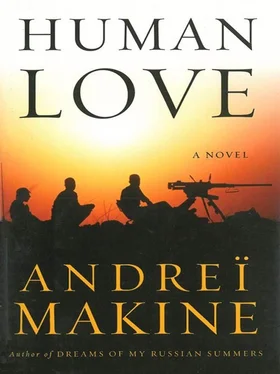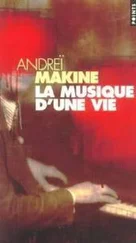
Copyright © 2004, 2011 by Editions du Seuil
English-language translation copyright © 2008, 2011 by Geoffrey Strachan
ISBN: 978-1-61145-422-2

Andrei’ Makine was born and brought up in Russia, but Human Love , like his other novels, was written in French. The action takes place in various parts of the world, including several African countries, Russia, and elsewhere. The author includes in the French text a number of Russian words, which I have retained in this English translation. These include shapka (a fur hat or cap, often with ear flaps), izba (a traditional wooden house built of logs), taiga (the virgin pine forest that spreads across Siberia south of the tundra), kolkhoznik (a member of a collective farm in the USSR), and apparatchik (a member of the party administration, or apparat ) . Other Russian references include Nevsky Prospekt, the famous street in Saint Petersburg (Leningrad under the Soviet Union), and the battle of Borodino, a pyrrhic victory for Napoleon’s forces as they advanced on Moscow in 1812.
References to life in Angola under Portuguese colonial rule include contratados (men forced into “contracted” labor) and assimilados (native Angolans granted a degree of civic status). In postindependence Angola the MPLA (Movi-mento Popular de Libertaçao de Angola, or Popular Movement for the Liberation of Angola) formed the first government and was opposed by UNITA (Uniäo Nacional para a Independência Total de Angola, or National Union for the Liberation of Angola) for many years. Patrice Lumumba was one of the founders of the Mouvement National Congolais under Belgian rule. He became the prime minister of the newly independent republic of Congo in 1960, opposed the secession of Katanga, and was arrested by his own army and murdered. A number of African cities and towns are named in the text, including Luanda, Dondo, Cabinda, Lucapa, and Mavinga, Angola; Kinshasa, Zaire; Brazzaville, Republic of the Congo; Lusaka, Zambia; Maputo, Mozambique; Mogadishu, Somalia; Addis Ababa, Ethiopia; and Conakry, Guinea.
French political references include the nickname fasionaria for a militant female revolutionary, and the OAS (Organisation Armée Secrète), the French terrorist organization that opposed Algerian independence.
G. S.
WITHOUT THE LOVE HE FELT FOR THAT WOMAN, life would have been no more than a night without end in the forests of Lunda Norte on the frontier between Angola and Zaire.
I spent two days in captivity there with a colleague, a Soviet military instructor, and with what we took to be a corpse stretched out on the floor of our prison of dried clay, an African, dressed not in fatigues, like us, but in a dark suit and a white shirt stained brown with blood.
When under threat, our existence is laid bare and we are shocked by the stark simplicity of what drives it. During the hours of my imprisonment I discovered these crude mechanisms: fear erases our purported psychological complexity, then thirst and hunger drive out fear, and what remains is the staggering banality of death; the mind recoils, but this reaction soon becomes laughable in the face of the discomfort caused by small bodily needs (such as that, for both of us, of urinating in the presence of a corpse), and ultimately what arrives is disgust with oneself, with this little bubble of being that once considered itself precious in its uniqueness but will burst, along with all the other bubbles.
At nightfall the armed men who had arrested us seized four Zairean peasants, three men and a woman, who were crossing the frontier, bringing food to the “diggers,” as they call the diamond hunters locally. The men were stripped and slaughtered, the woman submitted to their violations with a placidity that lent an almost natural air to the brutality of these couplings. She remained totally silent, not a curse, not a groan. I remember one of the soldiers’ faces: the postcoital nausea, the drowsy aggressiveness of his gaze as he incuriously observed the convulsions of the one who just had taken his place between the Zairean woman’s broad thighs.
This blasé voyeur now had the urge to manhandle us; it was predictable, carnal fulfilment breeds dissatisfaction. He aimed several kicks at the long corpse of the African. Turning my face away to avoid the flailing boots, I thought I could hear footsteps outside the door, the click of a weapon. The idea of having to die at any minute wrenched a picture out of the darkness as clear as any black-and-white photograph: the dirty rope hobbling my ankles, the grease stains on the soldier’s pants, the unglazed window opening, very low down in the wall, through which I had just been observing the rapists. A woman’s voice, strangely joyful, rang out, cut short by a brief burst from a submachine gun. The soldier rushed outside, leaving each of us to his own remission: the Africans immobility, the instructors cough after taking a dose of spirit from a flask concealed in his combat kit, my own thoughts thrown into confusion between this sudden intimacy with death and the pleasure the men had taken in the Zairean woman’s plump body.
I was young, and this abrupt reduction of life to no more than pleasure and death did me good. It is easier to accept your end when you know you are a piece of flesh fighting to attain physical bliss (like the soldiers outside the window), and dying if it loses. “Those black UNITA bastards!” the instructor swore. He took another swig and almost immediately began snoring. I admired this man. He knew the raw truth of life. I was in the process of being initiated into his basic wisdom: we’re not unique, but all alike and interchangeable, pieces of meat, seeking pleasure, suffering, and battling against each other to possess women, money, and power, all of which are more or less the same thing, and one day losers and winners will be joined together in the perfect equality of putrefaction.
It was not cynicism; I lived these stark truths without really thinking, inhaled them along with the clammy sultriness that oozed over my skin, with the smell of decomposing bodies. The substance of the world was this organic mass, of which we were all a part – myself, the sleeping instructor, the dead African, the soldiers taking it in turns to ejaculate into the woman’s tormented vagina, the three peasants with their shattered skulls… I felt profoundly at one with this mass of humanity.
“That great fat slob, Savlmbi. One day hell get his face smashed in… ideological training… for the cadres…” The instructor was muttering in his sleep, swatting his face repeatedly to drive away the mosquitoes. I began to doze as well, numb with tiredness, content to dissolve into a stew of anonymous bodies.
The cry that went up outside had nothing impersonal about it. It was appallingly unique in its distress. Someone was being killed. Someone very specific was dying. A woman, that woman, the Zairean woman. I leaped up on my hobbled feet, clung to the narrow rectangle of the window. It was not a particularly cruel sight but eloquent of palpable, precise insanity. A soldier, the big sergeant who had interrogated us the day before, was squatting in front of the Zairean woman, now held on her knees in front of him by two soldiers. He was thrusting his fingers into the woman’s mouth, for all the world as if he were a dentist inspecting this gaping oral cavity. An electric flashlight in the hand of one of the soldiers lit up the sergeant’s face. A scar, a broad asterisk, smoothed by time, gleamed on his cheekbone.
Читать дальше











